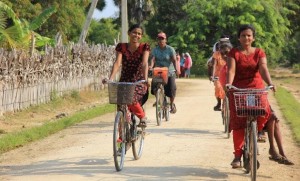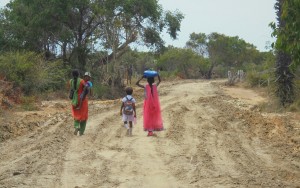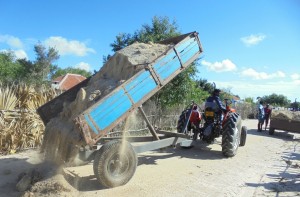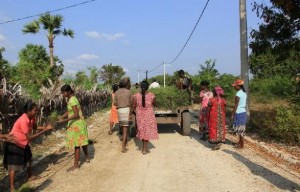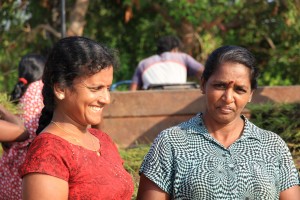Rehabilitating the Kovilvayal Village Internal Access Road in Kilinochchi
Internal access roads are essential for the smooth functioning of villages in rural Sri Lanka. They are used daily by residents to travel to workplaces, agricultural lands and children’s schools as well as to access towns and marketplaces. The lack of functioning roads results in the delay of resettlement and redevelopment of the community as they are faced with difficulties in transportation, information flow, and cultural exchanges.
The project for Rehabilitation of Community Infrastructure, Improvement of Livelihoods and Empowerment of Women in the Northern and Eastern Provinces (RCI), funded by the Government of Japan, is supporting the construction of community infrastructure including 32 km of access roads in the North and East of Sri Lanka. The RCI project is implemented by UN-Habitat through a participatory process with the community in close partnership with the Government of Sri Lanka.
Kovilvayal Grama Niladhari division is located 2.5 km from the nearest town of Iyakachchi in Pachchilaipalli Divisional Secretariat Division in Kilinochchi district. Located in the Jaffna peninsula, this village was badly affected by the three decades of conflict in Sri Lanka. Kovilvayal presently consists of 243 families with a population of 845 people. The majority of residents are engaged in agriculture while other key livelihoods include fishing and livestock farming. From 1990, the community suffered several displacements and moved to safe locations elsewhere in the Northern Province. In 2010, with the end of the conflict, they resettled in the village and started to rebuild their lives. With funding from the Indian Housing Project, UN-Habitat supported a number of families to construct permanent houses to replace their damaged and destroyed homes. However, the village also needed support to rebuild their community infrastructure, as much of it was badly damaged.
When UN-Habitat commenced the RCI project in the area, discussions were held with the community members to understand their priority needs through a Community Action Planning Workshop. The residents identified the rehabilitation of internal access roads as a key priority, as these roads had not been repaired for many years. The rehabilitation of a 2.1 km stretch of road consisting of two roads, Savaththi and Murugan, were selected for funding by the project. This stretch of road was used daily by the residents as it connects the village to the Iyakachchi – Mulliyan road, the main road connecting the village to Iyakachachi town. These rough, sandy roads were in a state of disrepair making accessibility difficult for residents especially during the rainy season.
The implementation of this project was managed by the community, with community members actively engaged in the planning and monitoring from the beginning. To implement the road rehabilitation work, UN-Habitat selected the Kovilvayal Women’s Rural Development Society (WRDS). The WRDS was led by its President, Mrs. S. Balarajini who was actively involved in the project together with the committee members. The Pachchilaipalli Pradeshiya Sabha (Council) coordinated closely with UN-Habitat on the road design and cost estimate. The Pradeshiya Sabha was also responsible for monitoring the physical progress of the work in partnership with
UN-Habitat. The Pachilaipalli Divisional Secretariat provided support to purchase gravel which was in short supply in the Northern Province. The Rural Development Officer monitored payments to the WRDS and ensured the smooth implementation of the project. A mixture of sand and gravel was used to construct the road. A special mixture of gravel with seashells available in the area was used as the top layer of the road. The total cost of the road construction was LKR.3,769,259.
In addition to managing the rehabilitation work on the ground, the WRDS volunteered their own time and labour towards the road construction. This included “shramadana” activities to clear the site as well as turfing the sides of the road with grass.
“We are really happy that this road has been repaired. This will help in further development of our village. For example, this rehabilitated road will help our village get electricity connections. It will also help residents to access services easily from the town areas. On behalf of the community, my sincere thanks to the Government of Japan for this timely assistance”. The Grama Niladhari of Kovivayal stated.
Discussing the successful completion of the road repair, Mrs. Balarajini said “This road has improved accessibility for our community. School children and parents are very happy now as they can cycle to school and save valuable time rather than walking three kilometres. On behalf of the village, we would like to thank the Government of Japan and UN-Habitat for supporting us.”
The RCI Project is a community infrastructure development project, contributing towards the sustainable rehabilitation and reconstruction of the conflict affected Northern and Eastern Provinces. Funded by the Government of Japan and implemented by UN-Habitat, it is assisting communities to overcome the hardships caused by the lack of basic services, whilst rebuilding human capital and empowering women. Implemented in the districts of Kilinochchi, Mullaitivu and Mannar in the North and Batticaloa in the East, the key project interventions include the construction of community centres, preschools, storage facilities, small irrigation tanks and the rehabilitation of internal access roads and storm water drainage systems. It follows on from the “Project for Rehabilitation of Community Infrastructure and Facilities in the Conflict Affected Areas in Northern Province” (RCIF), also funded by the Government of Japan and implemented by UN-Habitat in Kilinochchi and Mullaitivu from 2013 – 2015.

